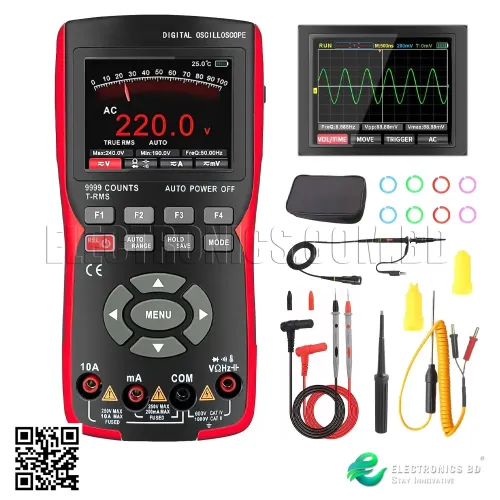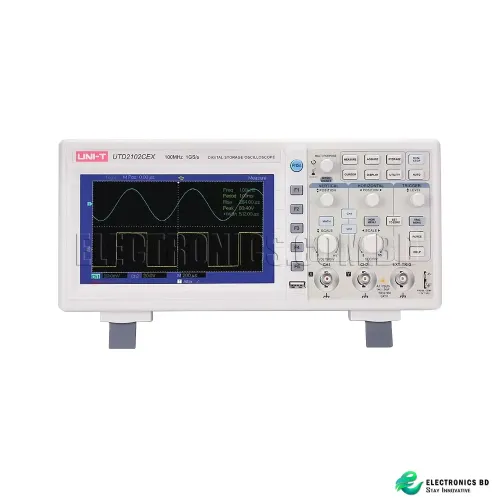NodeMCU Lua Lolin V3 Module ESP8266 ESP-12F Type C WIFI Wifi Development Board with CH340
- 3D printers & CNC
- Accessories
- Active Components
- All Departments
- CNC Accessories
- Electrical Accessories & IOT
- Latest
- Oscilloscope
- Passive Components
- Projects
- SMD Components
- Socket, Port & Jacks
- Sound Systems
- Drones & RC Hobby
- Sale
Your shopping cart is empty!
- Supply voltage (USB) 5V DC
- Input/output voltage 3.3V DC
- Clock frequency 80 MHz / 160MHz
- Instructions RAM 32kb
- Data ram 96kb
- External flash memory 4MB
- GPIO digital pins 17 (configurable as a PWM at 3.3V)
- ADC analog PIN 1 (but voltage area is: 0 - 1v)
- Uart 2
Package:
1x NodeMCU Lua Lolin V3 Module ESP8266 ESP-12F WIFI Wifi Development Board with CH340
Product Description
The NodeMCU Lua Lolin V3 Module is a feature-rich development board based on the ESP8266 ESP-12F WiFi module and equipped with the CH340 USB-to-serial converter for easy interfacing with computers. It serves as an excellent platform for creating IoT solutions, home automation systems, sensor networks, and more.
This board boasts a compact and lightweight design, coupled with a wealth of capabilities to suit a wide range of projects. With its flexible clock frequency options of 80MHz or 160MHz, it delivers sufficient processing power to handle diverse tasks. Furthermore, its 32KB instruction RAM and 96KB data RAM ensure efficient program execution and data storage.
Equipped with 4MB of external flash memory, the NodeMCU Lua Lolin V3 Module offers ample storage space for program code, data, and configurations. It features 17 GPIO digital pins, which can be configured as PWM outputs at 3.3V, providing versatility for interfacing with external devices and sensors.
Additionally, the development board includes one ADC analog pin with a voltage range of 0 to 1V, enabling analog-to-digital conversion for sensor readings and measurements. It also integrates two UART interfaces for seamless serial communication with other devices and peripherals.
Whether you're a novice or an experienced developer, the NodeMCU Lua Lolin V3 Module offers a user-friendly platform for building WiFi-connected projects and exploring IoT technologies. With its robust features and straightforward usability, it empowers you to transform your innovative ideas into practical applications.
What is the NodeMCU ?
The NodeMCU is an open-source firmware and development kit based on the ESP8266 WiFi module. It provides an easy-to-use programming environment for creating WiFi-enabled IoT (Internet of Things) projects and applications. NodeMCU allows developers to quickly prototype and deploy connected devices, sensors, and automation systems without the need for extensive hardware or software expertise.
The NodeMCU firmware is built on top of the Lua scripting language, making it accessible to beginners and experienced developers alike. It provides a rich set of APIs (Application Programming Interfaces) for WiFi networking, GPIO (General Purpose Input/Output) control, ADC (Analog-to-Digital Conversion), PWM (Pulse Width Modulation), and more.
Additionally, NodeMCU supports over-the-air (OTA) firmware updates, allowing developers to remotely update their devices with new features and bug fixes without physically connecting to them. This feature enhances flexibility and scalability in IoT deployments.
Overall, NodeMCU simplifies the process of building WiFi-connected projects by providing a user-friendly platform with extensive features and community support. It has become a popular choice among hobbyists, makers, and professionals for prototyping and deploying IoT solutions.
How the NodeMCU Works ?
The NodeMCU works by integrating the ESP8266 WiFi module with a development board and firmware that facilitates easy programming and connectivity. Here's a basic overview of how the NodeMCU works:
Hardware Integration: The NodeMCU development board integrates the ESP8266 WiFi module with additional components such as voltage regulators, USB-to-serial converters (like the CH340), and GPIO pins. This integration simplifies the hardware setup and provides a convenient platform for building IoT projects.
Firmware Environment: The NodeMCU firmware provides an environment for programming the ESP8266 module using the Lua scripting language. Lua is a lightweight and easy-to-learn language that allows developers to quickly prototype IoT applications without the need for extensive programming knowledge.
WiFi Connectivity: The ESP8266 module enables WiFi connectivity, allowing the NodeMCU to connect to local WiFi networks and the internet. This connectivity opens up a wide range of possibilities for IoT applications, such as remote monitoring, control, and data acquisition.
GPIO Control: The NodeMCU firmware includes APIs for controlling the GPIO pins on the ESP8266 module. These pins can be used to interface with sensors, actuators, displays, and other peripherals, enabling the NodeMCU to interact with the physical world.
Web Server and Client: With the NodeMCU firmware, developers can create web servers and clients directly on the ESP8266 module. This capability allows the NodeMCU to host web pages, serve HTTP requests, and communicate with other devices over the internet.
OTA Updates: NodeMCU supports over-the-air (OTA) firmware updates, enabling developers to remotely update the firmware on their devices without physically connecting to them. This feature streamlines the development process and allows for easy maintenance and feature enhancements.
Overall, the NodeMCU works by providing a comprehensive platform for building WiFi-connected IoT projects. Its integration of hardware, firmware, and development environment simplifies the process of prototyping and deploying IoT solutions, making it accessible to hobbyists, makers, and professionals alike.
Frequently asked questions FAQs about NodeMCU:
Q: What is NodeMCU, and what sets it apart from other development platforms? A: NodeMCU is an open-source firmware and development kit based on the ESP8266 WiFi module. It offers an easy-to-use programming environment for creating WiFi-enabled IoT projects. Unlike other platforms, NodeMCU provides built-in support for Lua scripting, making it accessible to beginners and experienced developers alike.
Q: Can I program NodeMCU using languages other than Lua? A: While NodeMCU's firmware is primarily based on Lua, it also supports programming in C/C++ using the Arduino IDE. This flexibility allows developers to choose the programming language that best suits their preferences and project requirements.
Q: How do I connect NodeMCU to my WiFi network? A: Connecting NodeMCU to a WiFi network is straightforward. You can use the
wifi.setmode()andwifi.sta.config()functions in Lua or the WiFi library in Arduino to configure the network credentials and establish a connection. Detailed instructions can be found in NodeMCU documentation and tutorials.Q: Can I use NodeMCU to create a web server? A: Yes, NodeMCU supports creating web servers directly on the ESP8266 module. You can use the built-in HTTP server APIs to handle HTTP requests, serve web pages, and communicate with other devices over the internet. This feature is particularly useful for IoT applications that require remote monitoring and control.
Q: Is it possible to update NodeMCU firmware over-the-air (OTA)? A: Yes, NodeMCU supports over-the-air (OTA) firmware updates, allowing you to remotely update the firmware on your devices without physical access. This feature simplifies the process of deploying updates and enhancements to NodeMCU-based projects, improving flexibility and scalability.
Similar Products:
NodeMcu V3 ESP8266 WIFI Module Development Board with CH340
NodeMCU Lua Lolin V3 Module ESP8266 ESP-12F WIFI Wifi Development Board with CH340
NodeMcu Lua ESP8266/12E V2 WIFI Module Based on CP2102 Board
ESP8266 NodeMCU DevKit Development Board
TTGO T-Call V1.3 ESP32 Wireless Module SIM Antenna SIM Card SIM800L Module And GSM/GPRS Antenna
ESP32-CAM WIFI ESP32 CAM Wireless Development Board With OV2640 Camera















